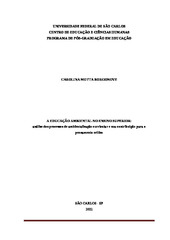A Educação ambiental no ensino superior: análise dos processos de ambientalização curricular e sua contribuição para o pensamento crítico
Abstract
The process of "environmentalizing the curriculum" has been turned the main way of educational transformation to the development of more sustainable societies. This process has great importance in the academic context, where the basic formation of a high number of diverses professionals of which will work with many environmental matters, promoting in the academic institutions the thinking about their role about the alternative demands to the current one model of civilization. Regarding this, the goal of the present research is to understand the way of these processes of environmentalizing the curriculum into the academic institutions during the last 20 years, through of analysis of researched publications nationals’ magazines about the issue. Specifically, we tried to understand how environmentalizing the curriculum process have been contributed for the construction of environmental education within a critical and emancipatory perspective in the academic institutions and with this process is occurring, trying to highlight the barriers, challengers and the successful experiences found in its establishment. The theoretical background guiding this study is the Critical Theory of Frankfurter and the Critical Environmental Education, both allow a complex analysis of the environmental matters with their interface among the social and educational regards. The data base of this study was selected from the published researches indexed in the Academic Google, and CAPES Plataform, occurred in the last 20 years, using the following keywords: "environmentalizing curricular", "environmental education", “higher education”. The research methodology used was discursive textual analysis. The results point out that the environmentalizing the curriculum process had an important increase in the last decade, driven by the growth of the environmental debate and the demands of the labor market, but this process has been still incipient to deal with the challenges that it wants to attend. What has been observed is the treatment of the environmental matters in a simple way, through the specific subjects, that many times highlight technical aspects of environmental issues, aiming for practical solutions with short durability. It is pointed too, the lack of an epistemological and methodological identity where the environmental education can be localized, making difficult the process enviromentalizing the curriculum within a critical and emancipatory perspective. Regarding this, the main suggesting pointed out in the present study to overcome these barriers were: the treatment of environmental issues in a complex, interdisciplinary and mandatory way in curricula, the creation of institutional spaces for the continuous training of teachers, the integration between public policies for teacher education and public policies in EE, in order to overcome deficiencies in the initial and continuing training of teachers as well as the environmentalization of the entire campus, including teaching, research, extension and university management.
Collections
The following license files are associated with this item:

